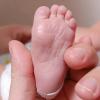Since 1 October, the metabolic disorder adrenoleukodystrophy (ALD) has been added to the Dutch newborn blood spot screening. From now on, the blood of newborn boys will also be tested for this disorder. ALD in boys can be treated if it is detected in time.
